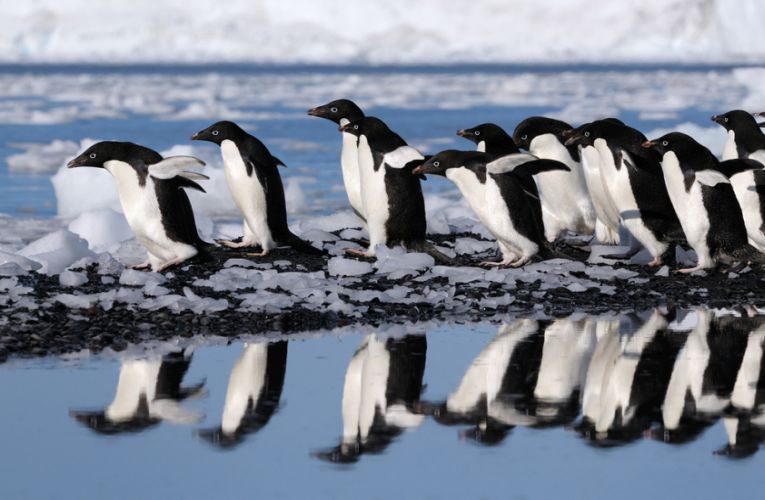18 species of penguin were surveyed in Phil Trathan's BAS (British Antarctic Survey) publication this week .Phil is the Head of Conservation Biology in the BAS. And 49 scientists contributed to the paper with advice on several mitigation measures. Their news release from the BAS can be viewed at - Pollution, Habitat Loss, Fishing and Climate Change as Critical Threats to Penguin. This attempt to analyse risk from habitat degradation both on land and at sea produced plenty of evidence. Other species of penguin of course will have many similar problems, and some that differ. The study is a response to the "substantial decline" in penguin populations worldwide over the last 20 years.
Competition with another species is one of the main problems. It's a mammal called humans, who predate the oceans' fish as if there's no tomorrow. We must never forget the other effects, particularly of climate change, death in nets and oil pollution, although at least we don't boil them any more to make oil!
The IUCN consider 11 species to be threatened and 2 as near threatened. Only 5 were classified as of least concern. The species concerned were the Emperor and Adelie (Antarctica), King, Chinstrap, Gentoo, Macaroni, Royal, Southern Rockhopper, Northern Rockhopper (Sub-Antarctic), Little, Fiordland, Snares, Erect-crested, Yellow-eyed (Oceania), and African, Magellanic, Humboldt and Galapágos (Africa and South America).
This prestigious group of scientists thought the main issues were loss of habitat, various forms of pollution and fishing. Climate change (ie. global warming) is reducing the low-latitude areas in which penguins can fish and breed, which will further affect habitat loss. Creating penguin marine reserves in the form of MPAs is regarded as the crucial move to ensure any species' survival. These would necessary be under international jurisdiction, which means there will be friction on the High Seas between nations and between commercial and conservation interests.
To quote Dr. Phil Trathan, "Whilst it is possible to design and implement large-scale marine conservation reserves it is not always practical or politically feasible. However, there are other ecosystem-based management methods that can help maintain biodiversity and a healthy ecosystem. For example, the use of spatial zoning to reduce the overlap of fisheries, oil rigs and shipping lanes with areas of the ocean used by penguins; the use of appropriate fishing methods to reduce the accidental bycatch of penguins and other species; and, the use of ecologically based fisheries harvesting rules to limit the allowable catches taken by fishermen, particularly where they target species that are also food for penguins."
Other species of animal will benefit from any implementation of conservation. We have seen in the relatively populous Arctic just how degraded habitats have become. To avoid the loss of Antarctic habitats, we would need to act quickly to avoid the Arctic mistakes. There is very reason to be positive in this case however. The alternatives to Antarctic land-grabs and despoilations are far preferable to the greediest fishing industry or the political machines of both Northern and Southern Hemispheres.
Have a look at some of the 18 species, including rockhopper, king and emperor, in our past articles in The Earth Times on Penguins.










